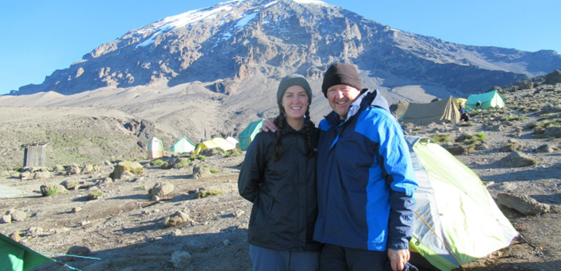It’s not every day you have the opportunity of trekking up Africa’s highest peak with one of your children. One of my daughters invited me to accompany her and one of her work colleagues to an 8-day trek up Mt Kilimanjaro. Apart from the usual need to get trek fit, have the right equipment and clothing, complete a medical check, and break in suitable walking boots, there are no real barriers to walking up Mt Kilimanjaro. But don’t be fooled, it is challenging (mentally & physically).
Mt Kilimanjaro is the highest free-standing mountain in the World – rising to 5,895 meters. It starts with rainforest and ends with a snow-capped peak. Climbing up is hard work, even though you have guides and porters to help support your journey, the weather plays a huge part in your level of comfort. There are practical tips for climbing Mt Kilimanjaro such as: “Pole Pole” (Slowly Slowly), drinking plenty of water, resting regularly, wearing suitable clothing, applying plenty of sunscreen, and walking at your pace – not someone else’s.
With all this front of mind, there were six things I learned climbing Mt Kilimanjaro which have applications to any team.
1: ENCOURAGEMENT IS INFECTIOUS
Colleagues, guides, and porters all encouraged and congratulated one another on each small milestone we achieved each day. This fuelled a sense of enthusiasm and confidence, but surprisingly it also helped build our resilience. The easiest option at any stage of the trek is to quit and head down the Mountain. But given everyone on the team was providing so much encouragement and support, you don’t want to let the side down – and hence become more determined to press on.
Lesson: Team Encouragement and Enthusiasm fosters resilience and a sense OF ‘CAN DO’
2: EVERYONE IS HURTING GOING UP THE MOUNTAIN
The pain and fatigue you are suffering going up the Mountain is not unique to you. Everyone is in the same boat. Everyone is fatigued (no matter who you are or the role you have) and dealing with their own issues. Any personal complaints about specific aches or ailments provides no support to team dynamics. Instead, a friendly pat on the back, helping hand at difficult spots, grabbing a colleague’s water bottle for them, or a supportive smile when resting was exactly the right behaviours. These promoted a sense of unity and confidence to reach the next ascent milestone.
Lesson: Supportive Positive Behaviours help Teams Through Challenging Moments
3: ONE DAY AT A TIME
Whilst we knew the aim was to make it to the Summit – that was academic if you did not achieve the day ahead milestone. Each day we would be briefed around what to expect for the day. This was broken into easier and harder bits, and we were told if we stuck together then there would be “no problems.” At no stage did we discuss any future days or what Summit Night would be like. The immediate focus was on ‘today’ and the successful completion of the day’s trek. We had to focus on the task at hand.
Lesson: A Major Goal can only be Achieved by Executing Smaller Milestones
4: BE AWARE OF SELF & OTHERS
To be a proactive team member, it required you to be both aware of yourself and aware of others. Your own health and well-being is your responsibility. If you are unwell, you become a burden to the Group. If you are well, you can support others who are not doing so well. Early intervention is crucial to survival; hence you need to constantly check-in on the verbal and non-verbal cues of your climbing colleagues. It is amazing what can be achieved in a nurturing environment where people feel a sense of support and belonging. Simple things such as stopping for a break, encouraging someone to drink water, sharing snacks, slowing down the pace to ensure everyone can keep up – ensured team unity and collaboration.
Lesson: Good Team Dynamics Starts with Individual Support of Self and Others
5: TEAM PASSION AND COMMITMENT IS EVERYTHING
It is amazing what can be achieved when you are pushed to your limit. However, when everyone is having to scale the Mountain regardless of age, job title, or physical fitness, it is amazing to see what can be achieved with a sense of unity and positivity. Each day the expectation was that, together, we will reach the next campsite, in readiness for dinner. Everyone committed to navigating each major hill, ridge, rock ledge or deep valley to collectively achieve the task at hand. There were times where, if I were on my own, I would have thrown in the towel and quit, but the team commitment helped you find your inner strength to uphold your personal requirements.
Lesson: Positive Team Dynamics Fuels Personal Commitment and Performance
6. ADAPTABILITY IS PARAMOUNT
Hope is not a strategy – you cannot hope it does not rain, as it likely will. You need to bring along contingencies to deal with the weather, illness, personal ailments, and equipment failure. There are many variables that need to be managed along the way, and you need to be prepared to deal with these variables in an agile and timely manner – without putting undue pressure or stress on colleagues. We passed many groups who were unable to successfully adapt to the changing weather or geographic conditions.
Lesson: You are only as Strong as Your Contingency Plan
REFLECTION…
Is climbing Mt Kilimanjaro something I would recommend everyone do? I am not sure. For me this was a once in a lifetime experience to share with my daughter. Together we were able to plan, prepare, train, support and achieve something special together. I enjoyed the time away from emails, phone calls, social media, and meetings, to empty my head and have some critical reflection on my life priorities in a manner free from distractions. It is amazing what silence and the sounds of nature do to the mind. There is something special in the simple things in life.
Life is made up of many moments – take the time to have them and enjoy them!

A FINAL THOUGHT…
One final thought I have is around RESPECT. Respect for your body. RESPECT for the planet and all that lives on it, and RESPECT for others and their needs, feelings, and belongings. RESPECT is a two-way responsibility.

